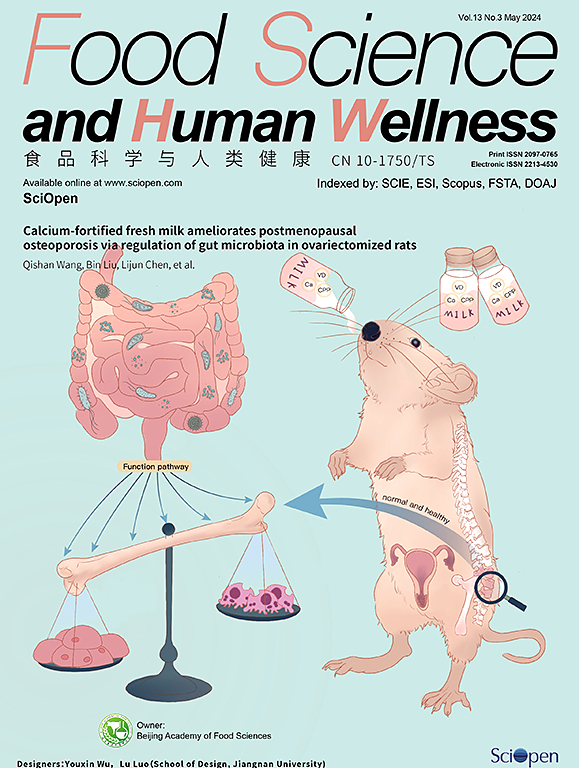Krill oil ameliorates benign prostatic hyperplasia by regulating G1-phase cell cycle arrest and altering signaling pathways and benign prostatic hyperplasia-associated markers
IF 7.4
1区 农林科学
Q1 FOOD SCIENCE & TECHNOLOGY
引用次数: 0
Abstract
Krill oil (KO) exhibits various biological activities, such as anti-inflammatory and antitumor effects. However, the inhibitory effects of benign prostatic hyperplasia (BPH) in vitro and in vivo have not yet been studied. This study investigated the anti-BPH effects of KO extracted by an enzymatic hydrolysis method. KO treatment inhibited the proliferation of WMPY-1 and BPH-1 cells by induction of G0/G1 phase arrest through the modulation of positive and negative regulators in both prostate cell types. KO treatment stimulated phosphorylation of c-Jun N-terminal kinase (JNK) and p38 signaling. In addition, KO changed the expression of BPH-related markers (5α-reductase, androgen receptor, FGF, Bcl-2, and Bax) and the activity of the proliferation-mediated NF-κB binding motif. KO-induced levels of proliferation-mediated molecules of prostate cells were attenuated in the presence of siRNA-specific p-38 (si-p38) and JNK (si-JNK). Furthermore, the administration of KO alleviated prostate size and weight and the cell layer thickness of prostate glands in a testosterone enanthate-induced BPH rat model. KO treatment altered the level of dihydrotestosterone in serum and the expression levels of BPH-related markers in prostate tissues. Finally, KO-mediated inhibition of prostatic growth was validated by histological analysis. These results suggest that KO has an inhibitory effect on BPH in prostate cells in vitro and in vivo. Thus, KO might be a potential prophylactic or therapeutic agent for patients with BPH.

磷虾油通过调节 G 1 期细胞周期停滞、改变信号通路和良性前列腺增生相关标记物来改善良性前列腺增生症
磷虾油(KO)具有多种生物活性,如抗炎和抗肿瘤作用。然而,体外和体内对良性前列腺增生(BPH)的抑制作用尚未见研究。本研究考察了酶法提取KO的抗bph作用。KO通过调节两种前列腺细胞类型的阳性和阴性调节因子,诱导G0/G1期阻滞,从而抑制WMPY-1和BPH-1细胞的增殖。KO处理刺激了c-Jun n末端激酶(JNK)和p38信号的磷酸化。此外,KO还改变了bph相关标志物(5α-还原酶、雄激素受体、FGF、Bcl-2和Bax)的表达以及增殖介导的NF-κB结合基序的活性。在sirna特异性p-38 (si-p38)和JNK (si-JNK)存在的情况下,ko诱导的前列腺细胞增殖介导分子水平降低。此外,在睾酮烯酸诱导的BPH大鼠模型中,给药KO减轻了前列腺的大小和重量以及前列腺细胞层厚度。KO治疗改变了血清中双氢睾酮水平和前列腺组织中bph相关标志物的表达水平。最后,通过组织学分析证实了ko介导的前列腺生长抑制作用。这些结果表明,KO在体内和体外对前列腺细胞的BPH有抑制作用。因此,对于BPH患者,KO可能是一种潜在的预防或治疗药物。
本文章由计算机程序翻译,如有差异,请以英文原文为准。
求助全文
约1分钟内获得全文
求助全文
来源期刊

Food Science and Human Wellness
Agricultural and Biological Sciences-Food Science
CiteScore
8.30
自引率
5.70%
发文量
80
审稿时长
28 days
期刊介绍:
Food Science and Human Wellness is an international peer-reviewed journal that provides a forum for the dissemination of the latest scientific results in food science, nutriology, immunology and cross-field research. Articles must present information that is novel, has high impact and interest, and is of high scientific quality. By their effort, it has been developed to promote the public awareness on diet, advocate healthy diet, reduce the harm caused by unreasonable dietary habit, and directs healthy food development for food industrial producers.
 求助内容:
求助内容: 应助结果提醒方式:
应助结果提醒方式:


